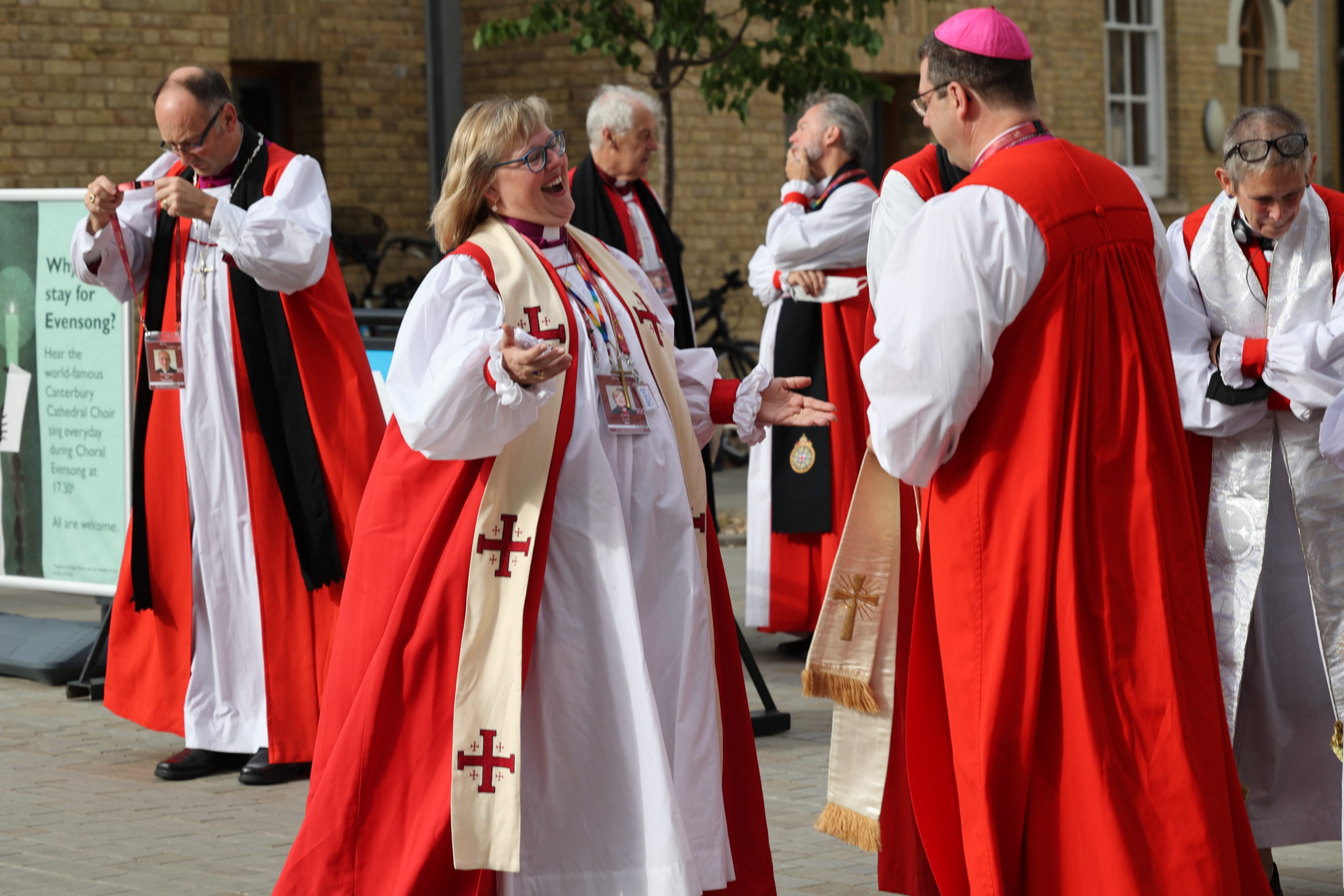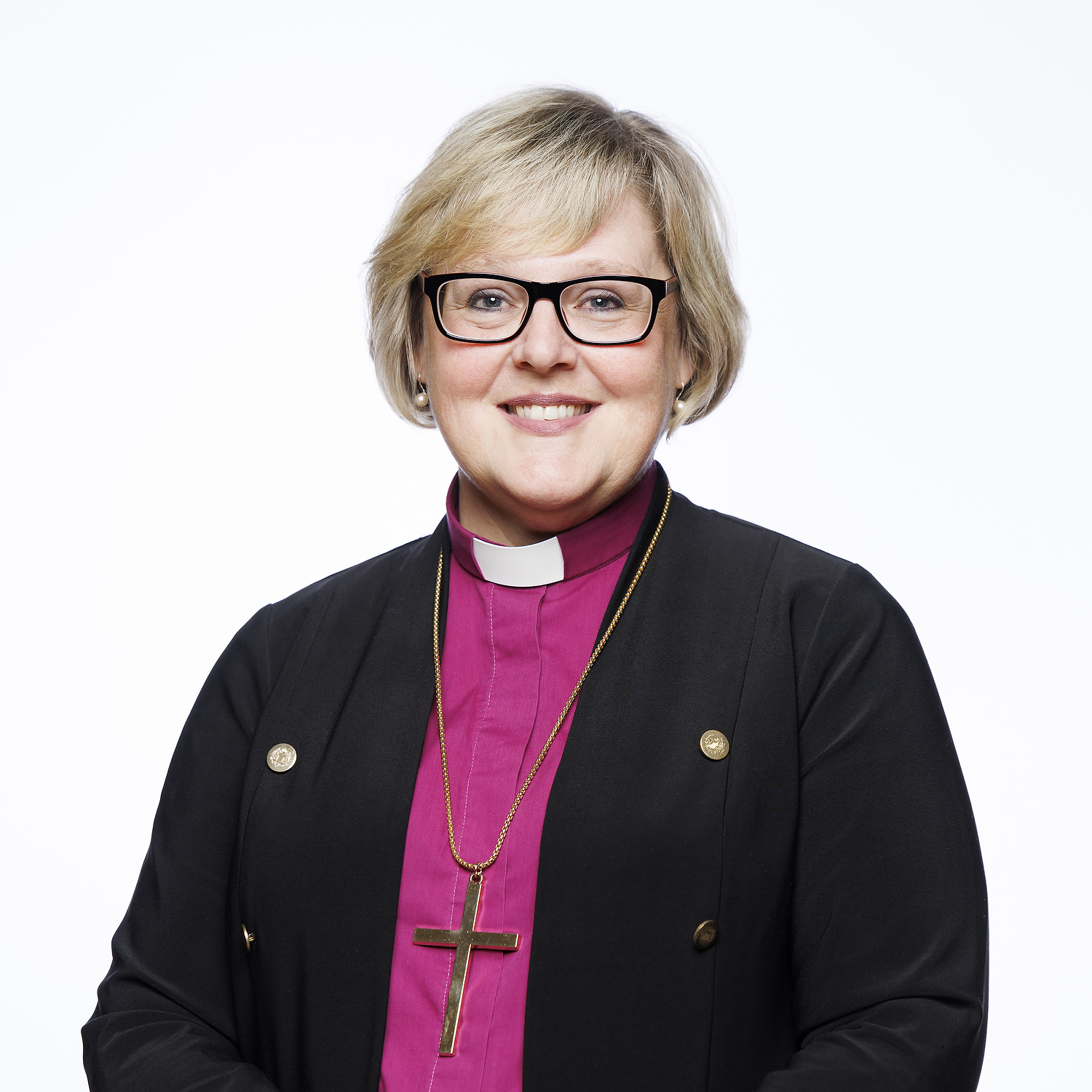The Lambeth Conference is a big event in a bishop’s life. Depending on which end of the decade in which it occurs, you’re either about to go, or have it to look forward to. In my case, it was the latter and after two postponements, it has finally happened.
Over 1500 bishops and spouses from 165 countries gathered at the University of Kent this summer to attend the Lambeth Conference, the global once-in-a-decade gathering of Bishops across the Anglican Communion. We came to walk, listen, and witness together. The theme for the conference was “God’s Church for God’s World.” The aim and goal of Lambeth is to gather the Anglican Communion and to work together for the sake of the world that God so loves. Through bible study, prayer, worship, and fellowship, we tried to learn how to respond to the needs of the 21st century world.
After a two-day retreat on the book of 1 Peter, we began the work of the conference. The plenaries were eye-opening, the biblical exposition and keynote talks by the Archbishop of Canterbury were superb, the ecumenical guests were eloquent and brave, and the worship was heart-achingly beautiful at times—particularly the opening Eucharist.
We learned, discussed, and prayed about many things: Mission and Evangelism, Safe Church, Anglican Identity, Reconciliation, Christian Unity, The Environment and Sustainable Development, Interfaith Relations, and Discipleship. Flowing from these themes were the “Lambeth Calls.” These were shared declarations, affirmations, and calls for action to the Church that will shape the Anglican Communion in the decade ahead.
We had time to gather to get to know each other at receptions, evening meals, and in social spaces. The Welbys graciously hosted us all at the Old Palace in Canterbury—it has housed all Archbishops of Canterbury since the 11th century. As the newly appointed co-chair for the global Anglican-Methodist Coordinating Committee I was invited to attend the Nikean Club reception for ecumenism, alongside The Patriarch of Jerusalem and other guests from the global church.
I was proud to be one of 97 female bishops at a reception to celebrate and support the female bishops in the Anglican Communion. In 2008, only 16 female Bishops attended Lambeth. In 1998, only a brave 6 did so. Of course, Primate Linda Nichols was one of those early female bishops. She was duly honoured within that group at the reception—and represented Canada so well throughout the conference. It was an incredible moment to watch her concelebrate at the closing Eucharist with Archbishop Thabo Makgoba—the first time at Lambeth that a woman has ever celebrated the Eucharist!
The day that the Welbys entertained 1500 for lunch at Lambeth Palace was particularly important. It was dedicated to learning about the climate crisis grounded in the lived experience of those with whom we broke bread. At my table were couples from around the world dealing with the consequences of the climate crisis. One couple from Madagascar shared about the constant cyclones and long droughts they are experiencing. From Pakistan, a couple spoke about the impact of political failure and devastating flooding—fully a third of Pakistan is under water as I write. A couple from South Sudan shared about the flooding of the Nile River, which has created a tense political atmosphere and rising tensions over access to fresh water in the region among those who share that precious resource.
It was a humbling and convicting day—comfortable and safe as we are in Niagara. My job was to listen and to pray and then to ask how we could help. We were invited to take part in the launch of the Anglican Communion Forest, which is a project with real impact. I left that day knowing first-hand the impact of the climate crisis and that our Church has a crucial role to play in protecting God’s creation.
If you asked me what the most important part of the Lambeth Conference was, I would have to say that it was the Bible study groups. As all of us know that when we gather to study scripture, when we speak about its meaning and importance in our lives, special things happen—relationships form, the understanding of context grows, concern and care for each other blossoms, and gospel friendship is established. The Holy Spirit wove her love and warmth among us and we truly became a Communion in miniature. I was deeply blessed, and educated by my Bible study companions—bishops from Liberia, Wales, South Sudan, West Virginia, and Greece. Some will be lifelong friends, while others were agents of the Holy Spirit teaching me important things in that moment. Each person was grounded in the experience of Lambeth and the power of the Gospel in real circumstances and in real peoples’ lives and I will be ever grateful for their company during the conference.
If it all sounds wonderful, that’s because it was. However, this does not mean that it was easy. In Bible study groups, in discussion groups, and in fellowship, we had difficult conversations. At times it was tense—it was emotionally and spiritually exhausting. Some bishops found it impossible to maintain communion, which was a visible sign of division and a cause of pain and anguish for all of us. At times we argued, other times we listened deeply—at all times we were held in the Spirit’s tether.
With the guidance and support of the Archbishop of Canterbury, we disagreed well. He led us to a place of acceptance of the diversity of views on the question of same-sex marriage within our Communion. Archbishop Welby did this grounded in an interpretation of 1 Peter that was faithful and grace-filled. This process and result, to me, was a miracle! It also proved to me the viability and the vitality of the Anglican Communion.
In the midst of all this, I had a precious experience. Two journalists observed myself and Bishop Zechariah Monyot Biar from South Sudan, speaking fiercely one afternoon. What looked like an argument was really Bishop Zechariah and I speaking from our hearts and contexts about same-sex marriage. We disagreed then and we will continue to disagree but we understand each other’s realities far better now. Bishop Zechariah and I later had the privilege of being interviewed by the BBC to tell the story of how, through difficult conversation, through bearing with one another, and through hearing each other, we became friends—and more than friends—siblings in Christ. I believe that this experience was emblematic of the conference itself. I am grateful to God—and the Diocese of Niagara—for the opportunity to represent the Niagara region and to have had this experience.
Years ago, I was so captivated by the idea of the Anglican Communion that I chose this Church to be my own. I loved the idea of a church that transcended national boundaries, that lived according to the principles of unity in diversity, that embraced that genius principle of reception that allows us to do new things—to hear the call of God to be prophetic and brave. I was enthralled with the idea of nearly every country, race, gender, and language finding a place within this particular expression of the body of Christ. I have wondered over the years if that idea would become tarnished by the reality— especially recently. But it wasn’t. If anything, it became the opposite—burnished.
I am newly inspired by our determination to embrace unity over uniformity. We fight so hard to stay together. That’s worth a great deal in a world that seems bent on the destruction of beautiful, complicated, whole things. I am inspired by the priorities that were established as a global church at Lambeth. I look forward to sharing and exploring these with you at Synod and beyond, because with the guidance of the Holy Spirit, we have work to do—locally in our parishes, in our diocese, and nationally in order to contribute meaningfully to becoming God’s Church for God’s World!



Welcoming the Stranger: Lessons in Hospitality from Monastic Life